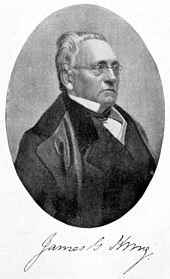James G. King
James Gore King (born May 8, 1791 in New York City , † October 3, 1853 in Weehawken , New Jersey ) was an American politician . Between 1849 and 1851 he represented the state of New Jersey in the US House of Representatives .
Career
James King was a member of a well-known family of politicians. His father Rufus King (1755-1827) was among other things US Senator for the State of New York . His older brother John (1788-1867) was Governor of New York State. King received classical training in France and England . On his return he studied at Harvard University until 1810 and then until 1812 at Litchfield Law School . During the British-American War of 1812 , King was the deputy adjutant general of the New York State Militia. From 1815 he worked in New York in trade. Between 1818 and 1824 he was employed in the banking industry in Liverpool, England . In 1824 he returned to New York, where he also worked in banking. He took up residence in neighboring Weehawken. King also got into the railroad business and became president of the Erie Railroad in 1835 .
Politically, King joined the Whig Party . In the congressional elections of 1848 he was elected to the US House of Representatives in Washington, DC in the fifth constituency of New Jersey , where he succeeded Dudley S. Gregory on March 4, 1849 . Since he refused to run again in 1850, he was only able to complete one legislative period in Congress until March 3, 1851 . There was heated discussion of the question of slavery during this time .
After his time in the US House of Representatives, James King returned to the banking industry. He died on October 3, 1853 on his estate "Highwood" near Weehawken.
Web links
- James G. King in the Biographical Directory of the United States Congress (English)
- James G. King in the database of Find a Grave (English)
| personal data | |
|---|---|
| SURNAME | King, James G. |
| ALTERNATIVE NAMES | King, James Gore (full name) |
| BRIEF DESCRIPTION | American politician |
| DATE OF BIRTH | May 8, 1791 |
| PLACE OF BIRTH | New York City |
| DATE OF DEATH | October 3, 1853 |
| Place of death | at Weehawken , New Jersey |


